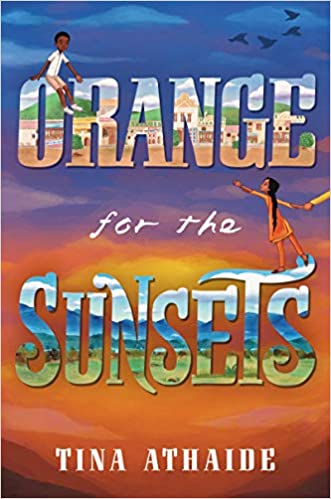Sometimes there are no happy endings. Children and their families are caught up in crises that are larger and more powerful than they are. Today it’s a deadly pandemic with no treatment and no cure. Throughout history, natural disasters and wars have torn families and communities apart and forced them from home.
Tina Athaide’s debut middle grade novel Orange for the Sunsets portrays two friends and one such crisis – the expulsion of 80,000 people of Indian origin from Uganda in 1972 following the military coup that brought General Idi Amin to power. Told from the alternating third person points of view of 12-year-old friends Yesofu, a Black African boy from a poor village near Entebbe, and Asha, an Indian girl living in a large house in the city where Yesofu’s mother works as a maid, the novel counts down the 90 days from Amin’s proclamation to the frantic departure of the last Indians in the country. Initially, Yesofu seems to benefit from the expulsion; when his rival’s family departs, he’s made captain of his school’s cricket team and gets to meet Uganda’s star player. For her part, Asha holds out hope that her father’s Ugandan citizenship and mother’s job as a nurse will save the family; she even hides the family’s passports so they won’t leave. Soon it becomes evident that these friends have put each other at risk, and the economic and cultural differences between them have grown too great for their friendship to survive. Despite everything, though, they find a way to show what years of friendship truly mean.

Orange for the Sunsets is based on Athaide’s own experience as a refugee from Uganda in 1972, as well as the stories she heard from friends and family. Short chapters that portray increasing danger keep readers turning the pages. The novel shows how hatred for the Other and the promise of confiscating their wealth can motivate even decent people to commit monstrous acts, a message that has become increasingly relevant as authoritarian governments today promise to make their countries great at the expense of those who look different or have different political views. Everyone loses when this happens, even those who think they’re winning. Athaide seamlessly integrates the history of colonialism into the story, as the British rulers left behind a system that allowed Indian businessmen, shopkeepers, and government administrators to keep the majority Black population in poverty. Despite some outdated and pejorative terminology, such as “tribe” and “hut,” and a more vivid depiction of the Indian characters and urban setting in comparison to Yesofu’s home, this is an important story of two children trying to save their friendship and their lives against all odds.
1 comment for “No Happy Endings: A Review of Orange for the Sunsets”